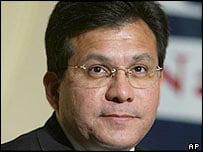In-Depth Coverage of Issues Concerning the Global Sikh Community Including Self-Determination, Democracy, Human Rights, Civil Liberties, Antiracism, Religion, and South Asian Geopolitics

| 'I note that you have the constitutional authority to make the determination you made on January 18 that the [Geneva Convention] does not apply to al-Qaeda and the Taleban.' |
| '. . . this is a new type of warfare - one not contemplated in 1949 when the [Geneva Convention] was framed - and requires a new approach in our actions towards captured terrorists.' |
| 'You should be aware that the Legal Adviser to the secretary of state (Colin Powell) has expressed a different view.' |
| That the U.S. would continue to be constrained by its commitments to treat detainees humanely, by applicable treaty obligations, by minimum standards of treatment universally recognised by the nations of the world and by applicable military regulations regarding the treatment of detainees. |
| 'Physical pain amounting to torture must be equivalent in intensity to the pain accompanying serious physical injury, such as organ failure, impairment of bodily function, or even death.' |
| 'Any effort by Congress to regulate the interrogation of battlefield combatants would violate the constitution's sole vesting of the commander-in-chief authority in the president.' |
| That if certain interrogation methods 'crossed the line' of the U.S. anti-torture laws, soldiers or U.S. officials might defend themselves from prosecution if 'the threat of an impending terrorist attack threatens the lives of hundreds if not thousands of American citizens.' |